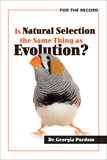Are Humans Driving Rapid Lizard Evolution?
News reports are proclaiming that human actions, in this case the building of a hydroelectric dam in Brazil, are “messing with evolution” because of changes in a species of gecko.1
Here’s what happened: a portion of the Brazilian countryside was flooded for this dam, isolating gecko populations from the mainland. When the larger lizard species that used to inhabit this part of the countryside died off, the geckos dominated. Within a mere 15 years, the geckos had bigger mouths and heads to eat the larger insects the other lizards would otherwise have snapped up. This change in the lizards, which happened independently on all five new islands, is being heralded as an example of “rapid evolution.”
“Rapid Evolution” Is the Norm
It’s worth pointing out that this so-called “rapid evolution” is far from an anomaly. Researchers are increasingly finding small, adaptive changes within a species popping up extremely quickly. Lizards, anole lizards in this case, got stickier toes in just 15 years in Florida; salmon adapted to changing water temperatures by migrating two weeks earlier; mice, bed bugs, other lizards, and moths have been showcased as having “rapidly evolved”; and scientists have even found that organisms on differing sides of a highway adapt differently.
In the news at the same time as the Brazilian geckos’ story is an example of supposed “extreme weather evolution” also involving lizards (green anoles in this instance).2 In 2013–2014 much of North America experienced extreme winter due to a southward shift in the polar vortex. Temperatures as far south as Texas were affected, and researchers found that during this one winter experience, anoles “faced selection pressures and evolved a greater tolerance to cold.” The changes in cold tolerance were represented in the anoles’ genomes after just one cold season.
Are they really observing evolution? It all depends on how you define “evolution.”
We’re told that evolution is supposedly an extremely slow process as natural selection and mutations do their miraculous work; yet scientists are now increasingly claiming evolution “happens before our eyes.” Are they really observing evolution? It all depends on how you define “evolution.”
Adaptation Not Evolution
Biological evolution is the supposed natural process that changed a single-celled organism into a human over millions of years via natural selection and mutations. Such a process would require the addition of vast amounts of brand-new information. Evolution, or the addition of new genetic information, has never been observed. Well, evolution has never been observed unless you take the word evolution and apply it to something completely different.
All of the examples I provided—changes in lizards, salmon, mice, bed bugs, or moths—are examples of natural selection. Natural selection is an observable process by which organisms adapt to a changing environment due to the massive amount of variation built into each genome. It results in information being lost or reshuffled, but never gained.
The news items reporting on the gecko study describes this nicely:
Those geckos among the original colony that had larger heads (and mouths) could eat a wider range of prey and so had more energy to put into survival and reproduction. As a result, they had more children and their genes for larger heads spread to a greater proportion of the next generation. This continued until larger heads had become a common feature of the group.
A Bait-and-Switch
What the evolutionists do in this instance, among many others, is describe an example of natural selection, such as selection pressures favoring lizards who already had bigger heads and mouths, and then call it evolution. So if natural selection—the supposed process behind evolution—is called evolution, then we can say that we observe it. But they didn’t observe any molecules-to-man evolution. They observed lizards producing more lizards like themselves. No new genetic material was gained.
Just because organisms change doesn’t mean they share a common ancestor.
This is what’s known as a “bait-and-switch” (or equivocation), a fallacy in argumentation. They bait you with examples of natural selection and then switch the definition and call natural selection evolution. Just because organisms change doesn’t mean they share a common ancestor.
When you read in the news about examples of “evolution in action,” “rapid evolution,” or “evolution before our eyes,” take a closer look. Likely you are just reading about another example of natural selection and adaptation.
Footnotes
- Jan Hoole, “Big-Headed Gecko Shows Human Actions Are Messing with Evolution,” Phys.org, August 1, 2017, https://phys.org/news/2017-08-big-headed-gecko-human-actions-messing.html.
- Marina N. Bolotnikova, “Extreme-Weather Evolution,” Harvard Magazine, August 3, 2017, http://harvardmagazine.com/2017/08/green-anole-polar-vortex-lizards-evolution.
Recommended Resources

Answers in Genesis is an apologetics ministry, dedicated to helping Christians defend their faith and proclaim the good news of Jesus Christ.
- Customer Service 800.778.3390
- © 2024 Answers in Genesis





